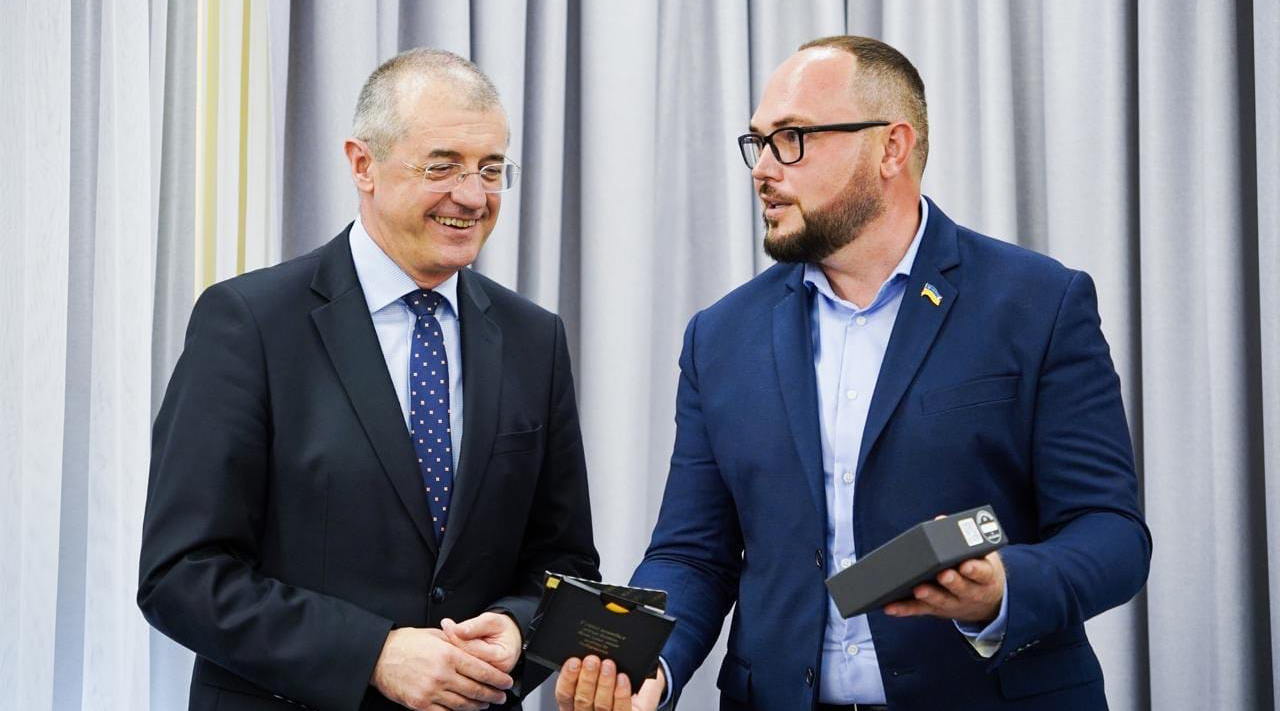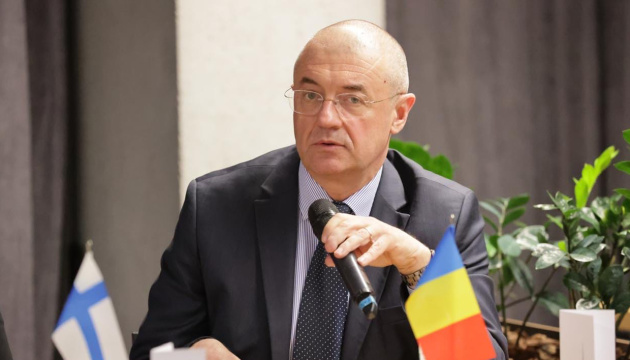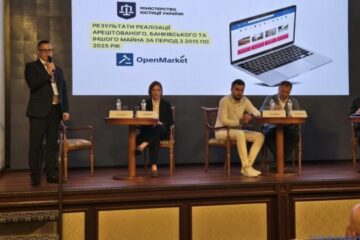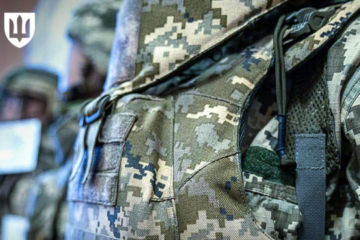Since Russia’s full-scale invasion of Ukraine in 2022, Romania has become one of Ukraine’s most reliable neighbors. Notably, after the collapse of the Soviet Union, Romania was among the first European countries to welcome Ukraine’s restored independence and establish diplomatic relations. However, it was only after Russia’s massive assault that Ukrainian-Romanian relations reached the level of a strategic partnership. In addition to providing military aid, Romania has also focused on joint infrastructure projects.
Alexandru Victor Micula, Romania’s Ambassador to Ukraine, arrived in Kyiv in the summer of 2022. Since then, he has visited several Ukrainian cities, including those near the front line. In an interview with Ukrinform, he discussed Romania’s view on the conditions needed for a truce in the Russian-Ukrainian war, the role of new security alliances within NATO’s broader framework, and a new shorter route from Kyiv to Bucharest.
[embedded content]
PEACE REQUIRES AN END TO RUSSIA’S ATTACKS ON CIVILIAN INFRASTRUCTURE
Q: Your Excellency, let’s start with this so-called meeting of U.S. President Donald Trump and Russian dictator Putin. How was it perceived in Romania?
A: Well, first of all, I think that we have to praise the fact that the U.S. has invested so much political and diplomatic energy in trying to find a political solution, ceasefire. But we have to focus on the next steps, and I think that the next step is for the transatlantic unity and coordination to continue to work in order to support Ukraine for obtaining a just and durable peace.
I think that the follow-up meetings happening this week, the meeting of President Zelensky in the United States with President Trump, as well as the meeting of the leaders of the European Union and some of the partners of the European Union that are also present today in Washington are very important, and to see if we can get a meeting this time with the presence and participation of Ukraine in the discussions with Putin. But the important thing is that stopping the attacks on civilians and civilian infrastructure is the first gesture that Putin should make in order for us to believe that he is truly engaged into negotiations of peace. So we have to continue to increase pressure on Russia, and we have to explain to the Russians that we cannot trust them as long as they continue to kill civilians.
And of course, Romania, as a country that is part of the Coalition of the Willing, is working with Ukraine and with the other partners in making sure that Ukraine gets the security guarantees it needs in order to be sure that we prevent future attacks of Russia against Ukraine. And because we are a neighboring country, we consider that the investment we are making in offering to Ukraine security guarantees are investments in our own national security.
So it was a nice, a decent effort from the part of the Americans, but we have to continue to coordinate and to stay strong together, to be united in order to force Russia to sit at the table of negotiations and to engage sincerely in negotiations that will lead to a just and durable peace in the terms that Ukraine wants.
For us, territorial integrity, sovereignty, and independence are the principles that have to be as terms of reference for any ceasefire or peace deal in the future.
Q: Yes, Your Excellency, yet we had today (on August 18) attacks on Sumy and on Kharkiv from Russia…
A: Very unfortunate, because I saw images of the attack on Kharkiv. It seemed to be a deliberate attack on a civilian building. There was no military asset or target in the vicinity of that civilian building. And again, with a significant number of lives that were lost, and of course the destruction that follows these attacks.
RUSSIA’S HYBRID THREATS ARE REAL
Q: Your President, Nicusor Dan, who, by the way, announced that maybe this autumn he will visit Ukraine, previously stated that there are grounds to speak of attempts by Russia to influence the outcome of presidential elections in Romania last year and this May. So, how is Romania protecting itself from Russian agents of influence?
A: Well, we have to counter this Russian aggression against democratic institutions by committing to protect the democratic institutions. So, all the measures that we are taking, trying to counter this offensive, hybrid offensive of the Russians, have to be taking into consideration the need to protect the democratic institutions of the country. And of course, we shouldn’t be shy in attributing the attacks. So, I think that we have been very clear about the source of the attacks, so Russia and its cronies have been playing a role in trying to disturb the Romanian electoral process.
And of course, we need to continue to work on strategic communications and countering disinformation. We need to improve media literacy in the general public opinion, and also we need to coordinate with NATO, EU countries and partner countries, because some of the attacks we have seen in Romania are being replicated in other countries that are having elections in the near future.
So, international cooperation in trying to tackle this Russian aggressive behavior that is trying to undermine the essence of the democratic institutions is important.
Q: Russian hybrid attacks are various. It also attacks GPS signals and there are threats from naval mines in the Black Sea. How is Romania countering these kinds of threats, and is there a growing concern towards them?
A: Well, the threat is real and this is why not only Romania, but also Turkey and Bulgaria have established a so-called demining coalition that in the meantime is fully operational. And they’re sweeping the territorial waters and the economic exclusive zone area, trying to clear the mines to identify if there are mines in that area and to clear them, which has also generated a positive effect on the way that the alternative corridor on the Black Sea is operating. Because now the ships that are leaving Odesa, they can enter Romanian territorial waters and Bulgarian territorial waters and Turkish territorial waters and to navigate in that area safely because of these concrete actions that the three countries are taking in order to clean the sea of mines in that area. But of course, this is an initiative that is open to other participants also. So we expect in the future to have additional countries that are helping us.
WE UPGRADED OUR LEGAL FRAMEWORK BECAUSE OF RUSSIAN DRONE ATTACKS
Q: While waging war against Ukraine, Russia also repeatedly violated Romanian airspace during drone attacks. In May, Romania adopted a law that allows the military to bring such drones down. How, in your opinion, will it contribute to Romanian security and will the next drone that illegally goes into Romanian airspace be really brought down?
A: Well, this new legislation is upgrading the procedures that were in place. There was a need to upgrade the procedures because this kind of threat with drones that are violating the Romanian airspace was not a threat that had the highest level of probability. So, given this concrete threat, we felt the need to upgrade our legal framework in order to be able to address better this threat. And also in coordination with our NATO partners to offer additional instruments for protecting the airspace of Romania and of the NATO member states. So, this is a process where, of course, we were focused on the Romanian legislation, but this has brought some important lessons learned that are being used by our other NATO countries. So, we hope to be able to handle these threats in such a way that will not put in danger, in jeopardy, the citizens of Romania.
Q: Also this early August Romania also scrambled its two F-16 fighter jets because of the massive attack from Russia on Ukraine. Could you elaborate on that?
A: Yes, and it’s not only once. It has happened a few times and we had to scramble both Romanian air fighters and also air fighters of NATO countries that are based in Romania in order to monitor the situation.
REGIONAL SECURITY ALLIANCES HELP DRAW NATO’S ATTENTION TO REAL THREATS
Q: If we’re talking about NATO, what’s your opinion about this Article 5 collective defense commitment? Is it sufficient nowadays amid the growing threats, military threats in Europe?
A: I think that Article 5 of NATO is as valid as always and it has been always a major factor of deterrence against military aggressions against the NATO countries. So I think that there is nothing questioning the relevance of Article 5.
But, of course, we work with countries from the region, most of them NATO countries, but also with countries that are partners of NATO, in order to develop regional formats of cooperation that are not meant to be an alternative to Article 5 or NATO. It’s not about that.
Article 5 and NATO are the bedrock of our security. But these formats of cooperation are allowing us to have a stronger voice in the organizations where we are part of and is allowing us to have a stronger voice in NATO in drawing the attention of our partners to the threats, the concrete threats we are facing in the regions, in the Black Sea, in the Baltic Sea, mostly on the eastern flank of NATO.
Q: So these regional alliances, they are strengthening somehow the NATO alliance, even if it’s not with the exact NATO members, right?
A: Exactly. It’s a complementarity. We have a format of cooperation within NATO, the so-called B9, the Bucharest 9, where we have nine countries from the eastern flank of NATO that are preparing together, coordinating together their positions before the major events of the alliance, like NATO summits.
But we also have initiatives that are open for a certain level of participation of partners, like the Three Seas Initiative, where Ukraine and the Republic of Moldova are observer states and are allowing us to coordinate our infrastructure projects, connecting us also from the point of view of the military mobility with partners like the Republic of Moldova and Ukraine.
So, these regional formats of cooperation are allowing us to have a stronger voice in explaining the security needs of this region. And so far, they have been efficient in getting support from other NATO countries that are not from the eastern flank.

WE HOPE TO COOPERATE WITH UKRAINE ON REGIONAL ENERGY PROJECTS
Q: Your Excellency, the European Union has plans to abandon Russian gas by 2027, and Romania may play a crucial role in it, with having over 200 billion cubic meters estimated reserves. So what are the plans of these developments?
A: I think it is important to cut completely the ties with Russian sources of energy, and we have to be self-reliant from that point of view by 2027. Of course, by the time the Neptune Deep perimeter will start producing gas, we will become the biggest EU country or the biggest EU producer of gas, and that will cover both the needs of the Romanian market, but also will offer stable supply for other countries from the European Union or the Republic of Moldova and Ukraine. And it is important to see these reserves that we are accessing now on the Black Sea also as part of the transition to the Green Deal, the decarbonization of the economy of the European Union, because the gas is a transition component of this process, that in the long term should allow us to benefit from energy security at affordable prices. We also are working in improving the interconnections, because it is not enough to have the resources. You need to be able to transfer the resources from one place to the other, so that we can work as a single market also in the area of energy, in the area of the gas market. And of course, Ukraine has also a significant potential, because we assume that there will be gas in the proximity of these reserves that we are accessing, and we hope to be able to work with Ukraine when we will be able to operate in that area, to cooperate with Ukraine also in exploring and exploiting together other resources on the Black Sea.
Q: Your Excellency, your country, Romania, gained unique, remarkable experience in fighting corruption by establishing a special body such as the National Anti-Corruption Directorate. And after that, over 90 percent, I believe, of those charged with corruption have received criminal penalties. What of this experience could be useful for Ukraine on its path to the EU?
A: I think this is only one of the areas where our experience is important, because you can learn from our achievements, but also from our mistakes. And when it comes to these specific institutions that were developed in Romania in order to fight and to prevent corruption, you have to look at the process – how is it that we have established the current structure, institutional structure? Why is it that the previous institutions didn’t work properly? And what is what we wanted to solve by giving the current shape of these institutions? What were the main challenges at the beginning? What were the resources they got in order to achieve their mandate? And what is the current status of affairs? Just by going through all these stages, Ukraine can learn a lot. And there are other areas also from different institutional frameworks of Romania that can provide the same kind of lessons learned to Ukraine, both related to the accession, as such, the negotiations, but also later on the integration process, which is not easy. So, the integration process in the case of Romania is not over yet. We have recently joined Schengen, and we are still not a full member of the Eurozone. So, all these procedures and processes are important and could present useful lessons learned for Ukraine, including our failures, including our achievements.
THE RESILIENCE OF KHARKIV RESIDENTS IS IMPRESSIVE
Q: Your Excellency, you mentioned today Kharkiv. On the day when we are recording this, 18th of August, Russia launched another attack on Kharkiv, killing a baby girl and a teenager and leaving over 20 people injured. You’ve been in Kharkiv when opening an honorary consulate there in March 2023. What impression did this city make on you?
A: Well, the gesture of opening the honorary consulate there has to do with our wish to show solidarity to one of the cities that was on a daily basis bombed since the very beginning of the large-scale invasion. So I don’t think that there was a day since the 24th of February 2022 where Kharkiv was not bombed by artillery, by drones, by missiles. Unfortunately, Kharkiv has been under constant threat and under constant aggression by the Russians. But on the other hand, the people I met there, they are resilient. Their strong commitment to stay in Kharkiv and to continue to work in Kharkiv, to continue to produce in Kharkiv is a source of example for many of us that have the privilege of being in Kharkiv. I was able to visit Kharkiv only twice since I came to Ukraine because of the security reasons.
But I remember that when I visited the Saltivka neighborhood, which was one of the most destroyed at that moment, I was impressed by the volunteers that were providing food and were providing assistance for the people that were coming back to re-establish their own homes. They were building, closing, putting windows to their apartments and they were not alone. So you have volunteers from other neighborhoods of Kharkiv that were working together with them in order to claim back their life.
And of course, the continuous shelling is generating additional destruction. I remember that some of the sites that I visited in Kharkiv are not there anymore and also some of the persons I met are not there anymore. So I’m both sad because of the tragedy that continues, but at the same time, I’m impressed by the resilience of the people there. And I think that a lot of the partners we have there in Kharkiv are examples to follow, models in life for someone who refused to give up their city, refused to give up their routine, their day-to-day life. It’s just amazing what they are doing there.
ROMANIA AND UKRAINE ARE STRENGTHENING CROSS-BORDER INFRASTRUCTURE COOPERATION
Q: When we hear about the upcoming projects everywhere in Ukraine, we gain hope. Let’s talk a little bit about the upcoming projects, mutual projects in the sphere of infrastructure and transportation.
A: Well, we have signed in October 2023 a memorandum on a master plan for developing the infrastructure at our border. And we are advancing in implementing that. I think that the most important project that will be inaugurated this year will be the new bridge over the Tisza river, connecting Sighetu Marmatiei in Romania to Bila Tserkva (Solotvyno community, Tiachiv district, Zakarpattia region) in Ukraine. And that will be a major project because of the capacity that that checkpoint will have. And because of the fact that in that area of our common border, we don’t have many checkpoints.
We are also discussing about new checkpoints, two completely new, two existing in our bilateral agreements, but with a different regime regarding the transport and regarding the program of operating those checkpoints. And we are also expanding the current checkpoints on Siret-Porubne. We are going to expand the number of lines for trucks. I think that the Ukrainian side will be ready by the end of this year to move from two to six lanes per direction for trucks. And I think that we are going to be ready in the latest in April next year. So those are some of the projects we have when it comes to improving road connections.
And we also hope to have very soon a passenger connection, train connection between Kyiv and Bucharest, because that will have also a symbolic meaning. It’s a long trip, but it’s a direct connection between our capitals that will contribute to the other bridges we are building, cultural, economic and humanitarian bridges.
Q: When can this be established?
A: We did the technical test from the 7th to the 9th of August. And we are waiting to see the technicians, what the technicians are saying, because we are speaking about four wagons that would depart from Kyiv and reach Bucharest through Chisinau.
Q: Amazing. So this autumn is going to be busy for mutual relations and hopefully profitable for both of us.
A: Absolutely. I think that as a neighboring country, all the investments we have together with Ukraine on the border are contributing to the reconstruction of Ukraine also. And in many projects, we work in a trilateral format with the Republic of Moldova, because most of the infrastructure that Ukraine is building at the border with the Republic of Moldova needs to have a correspondent on the border of the Republic of Moldova with Romania, so that the merchandise and the people that are exiting from Ukraine to Moldova in order to reach the European Union can have the infrastructure needed.
So we coordinate also trilaterally. Same when it comes to energy connections, pipes, electricity cables and so on. Its trilateral cooperation with the Republic of Moldova and Ukraine has become a habit that is producing positive results for the citizens of the three countries.
Q: Thank you for this conversation.
A: Thank you so much. Thank you very much for the invitation and looking forward to the next conversation.
Anna Kostiuchenko, Kyiv
Photo courtesy of the Embassy of Romania in Ukraine
Source: Alexandru Victor Micula, Romanian Ambassador to Ukraine




